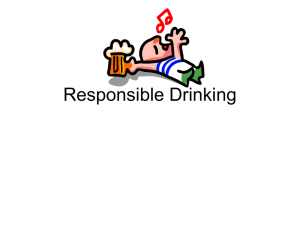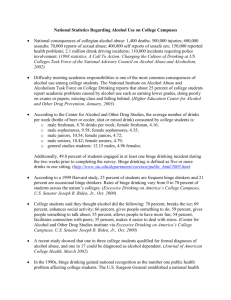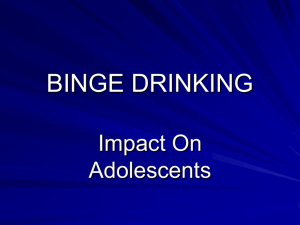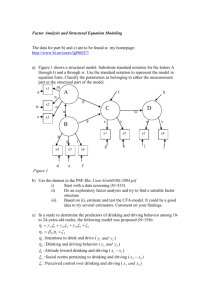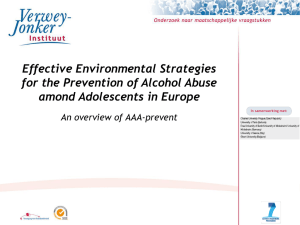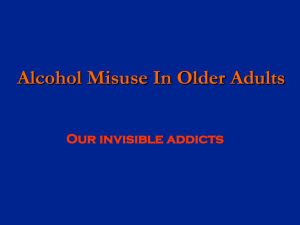Participant Information Statement
advertisement
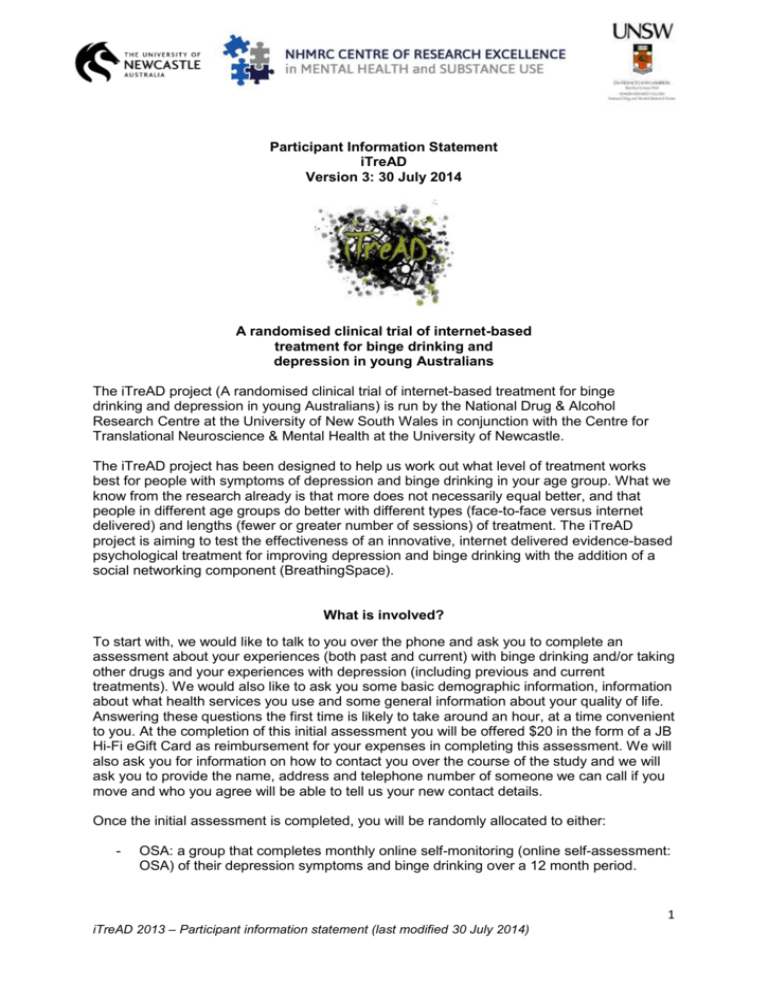
Participant Information Statement iTreAD Version 3: 30 July 2014 A randomised clinical trial of internet-based treatment for binge drinking and depression in young Australians The iTreAD project (A randomised clinical trial of internet-based treatment for binge drinking and depression in young Australians) is run by the National Drug & Alcohol Research Centre at the University of New South Wales in conjunction with the Centre for Translational Neuroscience & Mental Health at the University of Newcastle. The iTreAD project has been designed to help us work out what level of treatment works best for people with symptoms of depression and binge drinking in your age group. What we know from the research already is that more does not necessarily equal better, and that people in different age groups do better with different types (face-to-face versus internet delivered) and lengths (fewer or greater number of sessions) of treatment. The iTreAD project is aiming to test the effectiveness of an innovative, internet delivered evidence-based psychological treatment for improving depression and binge drinking with the addition of a social networking component (BreathingSpace). What is involved? To start with, we would like to talk to you over the phone and ask you to complete an assessment about your experiences (both past and current) with binge drinking and/or taking other drugs and your experiences with depression (including previous and current treatments). We would also like to ask you some basic demographic information, information about what health services you use and some general information about your quality of life. Answering these questions the first time is likely to take around an hour, at a time convenient to you. At the completion of this initial assessment you will be offered $20 in the form of a JB Hi-Fi eGift Card as reimbursement for your expenses in completing this assessment. We will also ask you for information on how to contact you over the course of the study and we will ask you to provide the name, address and telephone number of someone we can call if you move and who you agree will be able to tell us your new contact details. Once the initial assessment is completed, you will be randomly allocated to either: - OSA: a group that completes monthly online self-monitoring (online self-assessment: OSA) of their depression symptoms and binge drinking over a 12 month period. 1 iTreAD 2013 – Participant information statement (last modified 30 July 2014) - OSA + DEAL: a group that completes monthly online self-monitoring (OSA) of their depression symptoms and binge drinking over a 12 month period and has access for 12 months to a 4-week program of web-based intervention (DEAL) for binge drinking and depressed mood. - OSA + DEAL + BreathingSpace: a group that completes online monthly selfmonitoring (OSA) of their depression symptoms and binge drinking over a 12 month period and has access for 12 months to a 4-week program of web-based intervention (DEAL) for binge drinking and depressed mood and has access for 12 months to a purpose built social networking site (BreathingSpace). Given this is a research project, you will not be able to choose which treatment group you are allocated to. The monthly online self-monitoring (OSA) will consist of completing a short questionnaire on your mood over the last week, recording the number of times you engaged in binge drinking in the last month and answering a few questions related to your experience of the program so far. It should take approximately 10 minutes to complete. The 4-week program of web-based intervention for binge drinking and depressed mood (DEAL) consists of information and interactive components, including case vignettes and insession exercises which you can access via the internet. It will give you tips for reducing alcohol consumption and for improving your mood. This treatment program covers the relationship between alcohol and depression and aims to teach you to cope with your desire to drink, how to recognise and avoid high-risk situations for drinking, and how to plan alternative ways of coping with those situations where you usually drink. There are four treatment modules that we encourage you to complete at a rate of one module per week. However, you will have access to the program and be able to review the material and information for the entire 12 month period. The treatment uses cognitive behaviour therapy (CBT) and motivational interviewing techniques. CBT is an evidence-based psychological treatment that targets problematic patterns of thinking, feeling and behaving that may be associated with an increase in drinking and depression symptoms. We hope to learn whether this new treatment program is able to assist young people who experience depression and binge drinking reduce their drinking and improve their mood. The social networking site (BreathingSpace) will be similar to a Facebook group (except that it will be anonymous) enabling people to post their thoughts, messages of support, update their status, tell their stories, share self-assessment results, and report on progress related to their mood and binge drinking (successes and challenges). Only people in the research project allocated to this condition will have access to this site. Your consent will be sought for four follow-up phone assessments scheduled to occur at 6, 9, 12 and 15 months after the initial assessment, where you will be asked similar questions to the initial assessment. At the completion of each of these four assessments, you will be offered $20 in the form of a JB Hi-Fi eGift Card as reimbursement for your expenses in completing these assessments, and, if all of the four follow-up assessments are completed, you will also be offered a bonus $20 JB Hi-Fi eGift Card at the completion of the study. The results of each of these assessments will be recorded against your unique ‘participant number’ that has been allocated to you for the project. No personally identifying information will be linked with your participant number (as indicated in the ‘How will we use your information’ section below). Request to access Medicare data related to you 2 iTreAD 2013 – Participant information statement (last modified 30 July 2014) We will also ask your permission to access your Medicare records in relation to what services and medication you have used over the course of the study (including the follow-up period). Specifically, we are asking to gain access to: the date and type of service provided; whether or not this service was provided in a hospital setting; any medications you have used; and the date that these medications were supplied. Individual participants’ Medicare Benefits Schedule (MBS) and Pharmaceutical Benefits Scheme (PBS) claims will be requested from Department of human Services (DHS) by the investigators. This information includes the total cost identified by Medicare for the provision of your health care services, including doctor’s visits, blood and radiology tests, medications etc. You will be asked whether you agree to this, if so, you will be asked to sign a specific consent form from the DHS. An example of what the requested information will look like is: Hospital Date of service Item number Item description 20/04/09 00023 Level B consultation N 06/03/09 01/03/09 03133X Oxazepham Tablet 30 mg 22/06/09 11700 ECG N 04/07/09 28/05/09 03161J Diazepam Tablet 2 mg indicator Date of supply Date of prescribing PBS item code Item description The purpose of accessing these records is to reduce the assessment burden on you, making assessments as streamlined and quick to participate in as possible, while still allowing us to find out this information. We will use this data to examine whether participation in any of our three treatment arms for iTreAD is associated with increases or decreases in service use. During the consent process, you will have the opportunity to agree or disagree with this option, without it affecting your participation in the current study or your relationship with the University of New South Wales or the University of Newcastle. How will we use your information? Any information that is obtained in connection with this study and that can be identified with you will remain confidential and will be disclosed only with your permission, except as required by law and departmental policy. If you give us your consent to participate in the study, we plan to discuss/publish the results at Scientific Conferences and in peer reviewed scientific journals. In any publication, information will be provided in such a way that you cannot be identified. The person interviewing you, the person coordinating the project, and a research team involving people from the National Drug & Alcohol Research Centre (the University of New 3 iTreAD 2013 – Participant information statement (last modified 30 July 2014) South Wales) and the Centre for Translational Neuroscience & Mental Health (the University of Newcastle) will have access to your information. At the start of the project, you will be given a numeric ‘participant’ number. All information that you provide for this project will only be identified by this number. Your name, address etc. information will be removed from this information. Your personal information will be accessed, used and stored in accordance with Commonwealth Privacy Laws and the NSW Health Records and Information Privacy Act 2002. Your answers to questions will be transmitted over a secure connection similar to that used for online banking. While it is possible to decode these messages, it is highly unlikey. Risks and Discomforts There is some risk that modifying alcohol use will be associated with withdrawal symptoms and an exacerbation of symptoms of depression. In fact, if your alcohol use if high there are also some medical risks, and we advise seeking medical advice before making any changes to your current alcohol use. However, these symptoms will be monitored throughout your study participation via the completion of your online monthly self-monitoring of depression symptoms and alcohol use. In an effort to avoid an increase in your alcohol or any depression symptoms, information will be provided to you outlining how and where to obtain further support. The research clinicians associated with the project will also monitor your progress on a regular basis. If you are in a crisis situation or need immediate assistance please use the below hotlines: Kids Helpline: 1800 551 800; http://www.kidshelp.com.au/ Lifeline: 131114; http://www.lifeline.org.au/ Both of these organisations also offer online support and counselling, so please access their websites if you prefer this option. If you are concerned about feelings or thoughts of suicide, a 24-hour service is available to help. The website for more information is: http://www.suicidecallbackservice.org.au/ or Ph: 1300 659 467 This organisation also provides a call back service, offering crisis counselling to people at risk of suicide, carers for someone who is suicidal, and those bereaved by suicide. Below are some other online resources that you may find helpful: Headspace: http://www.headspace.org.au/ Beyondblue: 4 iTreAD 2013 – Participant information statement (last modified 30 July 2014) www.beyondblue.org.au http://www.beyondblue.org.au/resources/for-me/young-people MoodGym: www.moodgym.anu.edu.au For concerns about your drinking, please consult your doctor or local community health service. Alcohol or other drug helplines are also currently available in the following states and territories. • Australian Capital Territory 24-hour Alcohol and Drug Telephone Line (02) 6207 9977 • New South Wales Alcohol and Drug Information Service (02) 9361 8000 1800 422 599 (rural) • Northern Territory Alcohol and Drug Information Service 1800 131 350 (NT only) Darwin (08) 8922 8399 Alice Springs (08) 8951 7580 • Queensland Alcohol and Drug Information Service 1800 177 833 (24-hour, Queensland only) • South Australia Alcohol and Drug Information Service 1300 131 340 (SA only) Adelaide (08) 8363 8618 • Tasmania 24-hour Alcohol and Drug Information Service 1800 811 994 • Victoria DirectLine 1800 888 236 DrugInfo 1300 858 584 Family Drug Helpline 1300 660 068 (VIC only) Youth Drugs and Alcohol Advice 1800 458 685 • Western Australia Alcohol and Drug Information Service (08) 9442 5000 1800 198 024 (rural WA only) Parent Drug Information Service (08) 9442 5050 1800 653 203 (rural WA only) If you would like to contact the iTreAD Project team at any stage, please do so via email: itread@unsw.edu.au. Your email will be answered within 72 hours. If you prefer to be contacted by telephone, please provide your preferred phone number in your email to the team, and a iTreAD team member will telephone you within 72 hours of receipt of your email message. For emergency situations (e.g. concerns about suicidality), or for assistance at 5 iTreAD 2013 – Participant information statement (last modified 30 July 2014) any time of the day or night, please phone the Lifeline support service on 13 11 14, Kids Helpline on 1800 551 800 or the Suicide Call Back Service on 1300 659 467. Termination of involvement in the project Whether or not you take part in the project, your relationship with the University of New South Wales or the University of Newcastle will be unaffected. If you decide to take part in this project, you can withdraw from the study at any time without giving a reason. Should you decide to discontinue your participation in the project at any time, you may do so by notifying a member of the research staff. If you decide to withdraw from the study, it will not affect your future relationship with the University of New South Wales or the University of Newcastle. If you decide to withdraw from the project, you have the option of also withdrawing all data relating to you. An exception to this is in the case of an adverse event, or a serious adverse event, where the data needs to be retained for regulatory reporting. We cannot and do not promise that you will receive any benefits from this project. You will be given a copy of this form to keep. We would also like to ask you whether we may contact you over the next five years about further research projects. If you agree to be contacted, this does not mean that you have to take part in any future studies. You can decide that at the time. During the consent process, you will have the opportunity to agree or disagree with this option, without it affecting your participation in the current study or your relationship with the University of New South Wales or the University of Newcastle. If you have any questions at any time or would like to request a summary of results, please contact me directly by email Email: f.kaylambkin@unsw.edu.au . Dr Frances Kay-Lambkin Psychologist Research Fellow National Drug and Alcohol Research Centre Research Team The research team for this project includes: Professor Amanda Baker, The University of Newcastle Professor Maree Teesson, The University of New South Wales Professor Kathleen Brady, Medical University of South Carolina 6 iTreAD 2013 – Participant information statement (last modified 30 July 2014) Associate Professor Terry Lewin, The University of Newcastle Complaints Complaints about this study may be directed to the Ethics Secretariat, The University of New South Wales, Sydney, 2052 AUSTRALIA (phone (02)9385 4234, fax (02)9385 6648, email: ethics.sec@unsw.edu.au). Any complaint you make will be investigated promptly and you will be informed of the outcomes. Your decision whether or not to participate will not prejudice your future relations with The University of New South Wales. If you decide to participate, you are free to withdraw your consent and to discontinue participation at any time without prejudice. 7 iTreAD 2013 – Participant information statement (last modified 30 July 2014)

